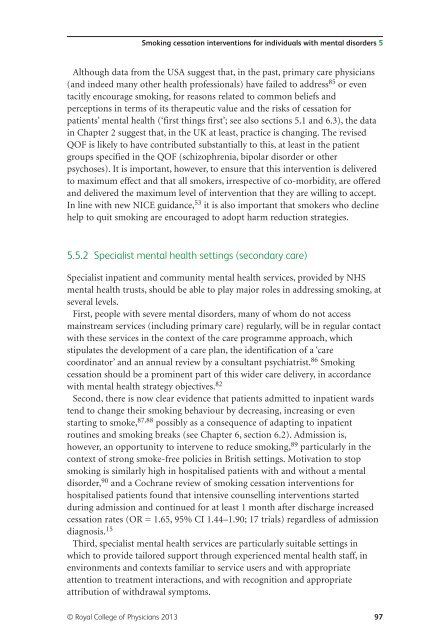Smoking and mental health - NCSCT
Smoking and mental health - NCSCT
Smoking and mental health - NCSCT
Create successful ePaper yourself
Turn your PDF publications into a flip-book with our unique Google optimized e-Paper software.
<strong>Smoking</strong> cessation interventions for individuals with <strong>mental</strong> disorders 5<br />
Although data from the USA suggest that, in the past, primary care physicians<br />
(<strong>and</strong> indeed many other <strong>health</strong> professionals) have failed to address 85 or even<br />
tacitly encourage smoking, for reasons related to common beliefs <strong>and</strong><br />
perceptions in terms of its therapeutic value <strong>and</strong> the risks of cessation for<br />
patients’ <strong>mental</strong> <strong>health</strong> (‘first things first’; see also sections 5.1 <strong>and</strong> 6.3), the data<br />
in Chapter 2 suggest that, in the UK at least, practice is changing. The revised<br />
QOF is likely to have contributed substantially to this, at least in the patient<br />
groups specified in the QOF (schizophrenia, bipolar disorder or other<br />
psychoses). It is important, however, to ensure that this intervention is delivered<br />
to maximum effect <strong>and</strong> that all smokers, irrespective of co-morbidity, are offered<br />
<strong>and</strong> delivered the maximum level of intervention that they are willing to accept.<br />
In line with new NICE guidance, 53 it is also important that smokers who decline<br />
help to quit smoking are encouraged to adopt harm reduction strategies.<br />
5.5.2 Specialist <strong>mental</strong> <strong>health</strong> settings (secondary care)<br />
Specialist inpatient <strong>and</strong> community <strong>mental</strong> <strong>health</strong> services, provided by NHS<br />
<strong>mental</strong> <strong>health</strong> trusts, should be able to play major roles in addressing smoking, at<br />
several levels.<br />
First, people with severe <strong>mental</strong> disorders, many of whom do not access<br />
mainstream services (including primary care) regularly, will be in regular contact<br />
with these services in the context of the care programme approach, which<br />
stipulates the development of a care plan, the identification of a ‘care<br />
coordinator’ <strong>and</strong> an annual review by a consultant psychiatrist. 86 <strong>Smoking</strong><br />
cessation should be a prominent part of this wider care delivery, in accordance<br />
with <strong>mental</strong> <strong>health</strong> strategy objectives. 82<br />
Second, there is now clear evidence that patients admitted to inpatient wards<br />
tend to change their smoking behaviour by decreasing, increasing or even<br />
starting to smoke, 87,88 possibly as a consequence of adapting to inpatient<br />
routines <strong>and</strong> smoking breaks (see Chapter 6, section 6.2). Admission is,<br />
however, an opportunity to intervene to reduce smoking, 89 particularly in the<br />
context of strong smoke-free policies in British settings. Motivation to stop<br />
smoking is similarly high in hospitalised patients with <strong>and</strong> without a <strong>mental</strong><br />
disorder, 90 <strong>and</strong> a Cochrane review of smoking cessation interventions for<br />
hospitalised patients found that intensive counselling interventions started<br />
during admission <strong>and</strong> continued for at least 1 month after discharge increased<br />
cessation rates (OR = 1.65, 95% CI 1.44–1.90; 17 trials) regardless of admission<br />
diagnosis. 15<br />
Third, specialist <strong>mental</strong> <strong>health</strong> services are particularly suitable settings in<br />
which to provide tailored support through experienced <strong>mental</strong> <strong>health</strong> staff, in<br />
environments <strong>and</strong> contexts familiar to service users <strong>and</strong> with appropriate<br />
attention to treatment interactions, <strong>and</strong> with recognition <strong>and</strong> appropriate<br />
attribution of withdrawal symptoms.<br />
© Royal College of Physicians 2013 97














